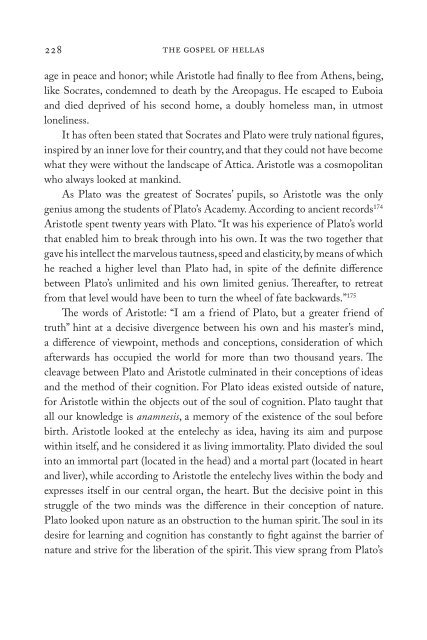The Gospel of Hellas - Research Institute for Waldorf Education
The Gospel of Hellas - Research Institute for Waldorf Education
The Gospel of Hellas - Research Institute for Waldorf Education
Create successful ePaper yourself
Turn your PDF publications into a flip-book with our unique Google optimized e-Paper software.
the gospel <strong>of</strong> hellas<br />
age in peace and honor; while Aristotle had finally to flee from Athens, being,<br />
like Socrates, condemned to death by the Areopagus. He escaped to Euboia<br />
and died deprived <strong>of</strong> his second home, a doubly homeless man, in utmost<br />
loneliness.<br />
It has <strong>of</strong>ten been stated that Socrates and Plato were truly national figures,<br />
inspired by an inner love <strong>for</strong> their country, and that they could not have become<br />
what they were without the landscape <strong>of</strong> Attica. Aristotle was a cosmopolitan<br />
who always looked at mankind.<br />
As Plato was the greatest <strong>of</strong> Socrates’ pupils, so Aristotle was the only<br />
genius among the students <strong>of</strong> Plato’s Academy. According to ancient records 174<br />
Aristotle spent twenty years with Plato. “It was his experience <strong>of</strong> Plato’s world<br />
that enabled him to break through into his own. It was the two together that<br />
gave his intellect the marvelous tautness, speed and elasticity, by means <strong>of</strong> which<br />
he reached a higher level than Plato had, in spite <strong>of</strong> the definite difference<br />
between Plato’s unlimited and his own limited genius. <strong>The</strong>reafter, to retreat<br />
from that level would have been to turn the wheel <strong>of</strong> fate backwards.” 175<br />
<strong>The</strong> words <strong>of</strong> Aristotle: “I am a friend <strong>of</strong> Plato, but a greater friend <strong>of</strong><br />
truth” hint at a decisive divergence between his own and his master’s mind,<br />
a difference <strong>of</strong> viewpoint, methods and conceptions, consideration <strong>of</strong> which<br />
afterwards has occupied the world <strong>for</strong> more than two thousand years. <strong>The</strong><br />
cleavage between Plato and Aristotle culminated in their conceptions <strong>of</strong> ideas<br />
and the method <strong>of</strong> their cognition. For Plato ideas existed outside <strong>of</strong> nature,<br />
<strong>for</strong> Aristotle within the objects out <strong>of</strong> the soul <strong>of</strong> cognition. Plato taught that<br />
all our knowledge is anamnesis, a memory <strong>of</strong> the existence <strong>of</strong> the soul be<strong>for</strong>e<br />
birth. Aristotle looked at the entelechy as idea, having its aim and purpose<br />
within itself, and he considered it as living immortality. Plato divided the soul<br />
into an immortal part (located in the head) and a mortal part (located in heart<br />
and liver), while according to Aristotle the entelechy lives within the body and<br />
expresses itself in our central organ, the heart. But the decisive point in this<br />
struggle <strong>of</strong> the two minds was the difference in their conception <strong>of</strong> nature.<br />
Plato looked upon nature as an obstruction to the human spirit. <strong>The</strong> soul in its<br />
desire <strong>for</strong> learning and cognition has constantly to fight against the barrier <strong>of</strong><br />
nature and strive <strong>for</strong> the liberation <strong>of</strong> the spirit. This view sprang from Plato’s

















